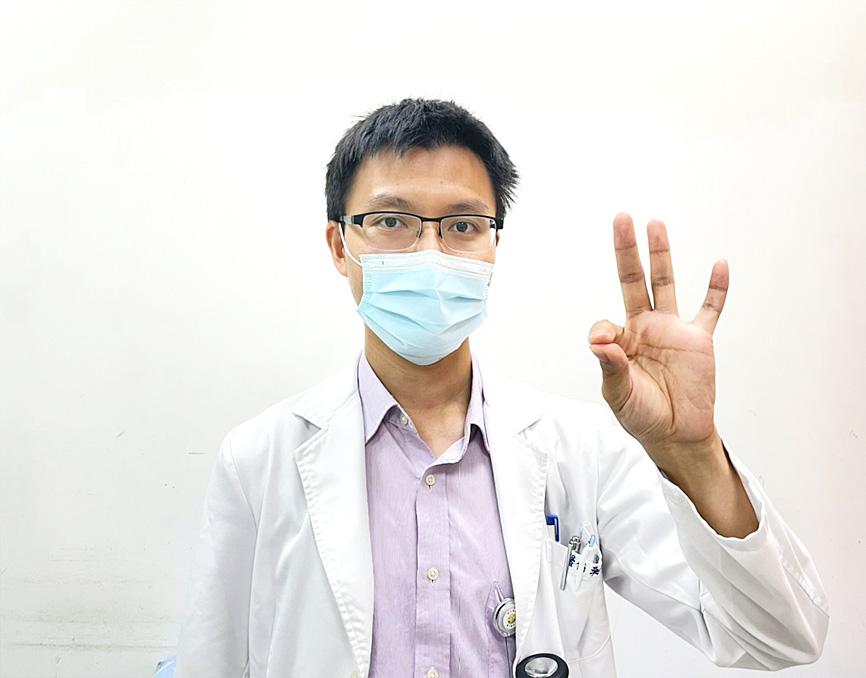Physical exercise and enough sleep help older people prevent Parkinson’s disease and other conditions leading to diminished brain functioning, medical experts have said.
Wu Yu-hsuan (吳宇軒), a neurologist at Taichung Hospital, said that one of his patients, a 63-year-old man surnamed Wang (王), had hand tremors and reported that his movements were becoming slower.
Wang’s family thought that it was a common condition for people his age, Wu said.

Photo: Tsai Shu-yuan, Taipei Times
However, when Wang became prone to falling, family members took him to the hospital and tests confirmed that he has Parkinson’s disease, Wu said, adding that Wang’s condition has since improved, thanks to medication prescribed at the hospital.
He is no longer prone to falling, Wu said.
Parkinson’s disease is caused by a degeneration of dopaminergic neurons in the midbrain’s substantia nigra, he said. Symptoms are a gradual loss of control over the body’s motor functions, with a typical onset at the age of 60.
As the disease progresses over time, it is often mistaken for a natural process due to aging, Wu said.
Its symptoms are difficult to discern, leading to many patients receiving a diagnosis six months to a year after symptoms first appear, he added.
Early signs of Parkinson’s disease are involuntary trembling of one hand or foot, parts of the body stiffening, or diminished speed of movement, Wu said.
If the disease progresses, a person with Parkinson’s might have trouble sitting or standing, Wu said, adding that shuffling while walking, dragging one’s feet and freezing while in motion are also typical signs that the condition is progressing.
They might eventually need a wheelchair or become bedridden, Wu said, adding that people tending for a family member with the condition often have to rely on professional help from a caregiver.
Lesser known symptoms are an abnormal sense of smell, constipation, involuntary shouting, disrupted sleeping patterns, making unusual sounds while sleeping, and erratic hand and foot movements, Wu said.
People with advanced Parkinson’s might experience orthostatic hypotension, memory loss, depression, difficulty swallowing when eating and other symptoms, he said, adding that these symptoms could lead to pneumonia and respiratory failure.
To reduce the risk of developing the disease, people should exercise regularly, eat healthily and avoid unhealthy habits, Wu said, adding that this would help the body reduce the level of free radicals in the brain, which contribute to the development of Parkinson’s.
For example, people should do stretching exercises with their fingers that include rapid movement, Wu said.
If people observe that they become slower, cannot fully stretch their fingers or have trouble opening two fingers pressed together, they should see a neurologist for a checkup, Wu said, adding that early prognosis is crucial for successful treatment.

A decision to describe a Chinese Ministry of Foreign Affairs statement on Singapore’s Taiwan policy as “erroneous” was made because the city-state has its own “one China policy” and has not followed Beijing’s “one China principle,” Deputy Minister of Foreign Affairs Tien Chung-kwang (田中光) said yesterday. It has been a longstanding practice for the People’s Republic of China (PRC) to speak on other countries’ behalf concerning Taiwan, Tien said. The latest example was a statement issued by the PRC after a meeting between Singaporean Prime Minister Lawrence Wong (黃循財) and Chinese President Xi Jinping (習近平) on the sidelines of the APEC summit

Taiwan’s passport ranked 34th in the world, with access to 141 visa-free destinations, according to the latest update to the Henley Passport Index released today. The index put together by Henley & Partners ranks 199 passports globally based on the number of destinations holders can access without a visa out of 227, and is updated monthly. The 141 visa-free destinations for Taiwanese passport holders are a slight decrease from last year, when holders had access to 145 destinations. Botswana and Columbia are among the countries that have recently ended visa-free status for Taiwanese after “bowing to pressure from the Chinese government,” the Ministry

‘SIGN OF DANGER’: Beijing has never directly named Taiwanese leaders before, so China is saying that its actions are aimed at the DPP, a foundation official said National Security Bureau (NSB) Director-General Tsai Ming-yen (蔡明彥) yesterday accused Beijing of spreading propaganda, saying that Chinese President Xi Jinping (習近平) had singled out President William Lai (賴清德) in his meeting with US President Joe Biden when talking about those whose “true nature” seek Taiwanese independence. The Biden-Xi meeting took place on the sidelines of the APEC summit in Peru on Saturday. “If the US cares about maintaining peace across the Taiwan Strait, it is crucial that it sees clearly the true nature of Lai and the ruling Democratic Progressive Party (DPP) in seeking Taiwanese independence, handles the Taiwan question with extra

HEALTHCARE: Following a 2022 Constitutional Court ruling, Taiwanese traveling overseas for six months would no longer be able to suspend their insurance Measures allowing people to suspend National Health Insurance (NHI) services if they plan to leave the country for six months would be abolished starting Dec. 23, NHIA Director-General Shih Chung-liang (石崇良) said yesterday. The decision followed the Constitutional Court’s ruling in 2022 that the regulation was unconstitutional and that it would invalidate the regulation automatically unless the NHIA amended it to conform with the Constitution. The agency would amend the regulations to remove the articles and sections that allow the suspension of NHI services, and also introduce provisional clauses for those who suspended their NHI services before Dec. 23, Shih said. According to